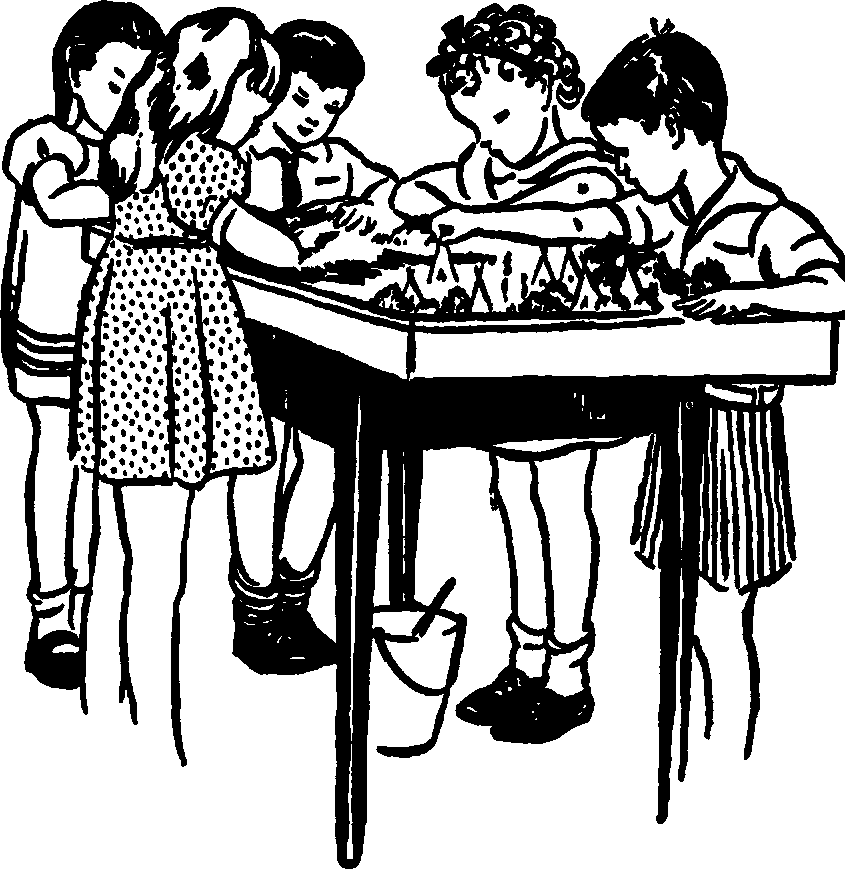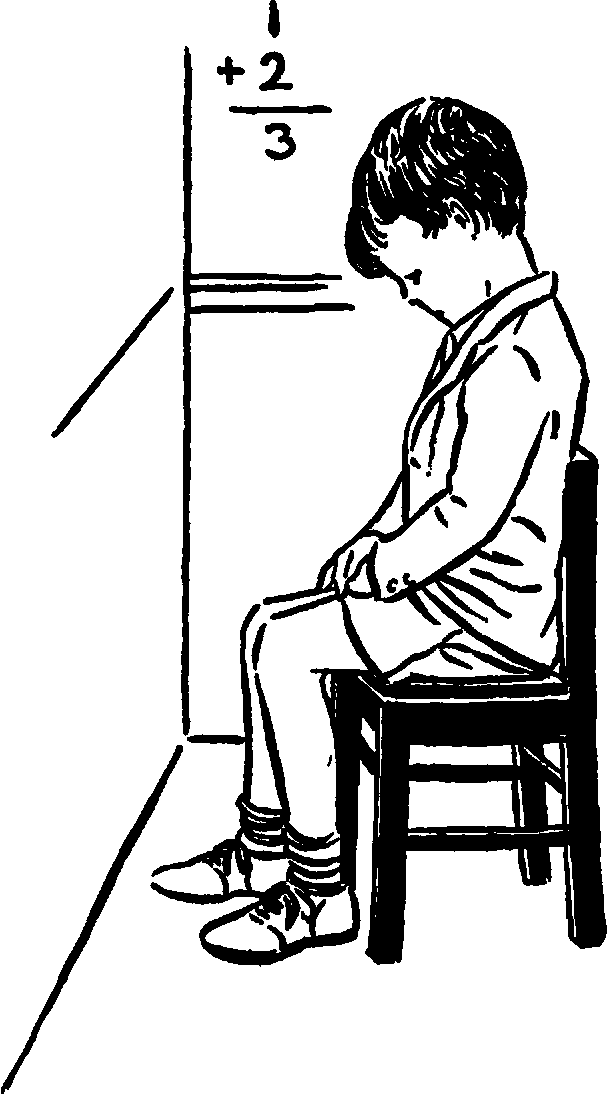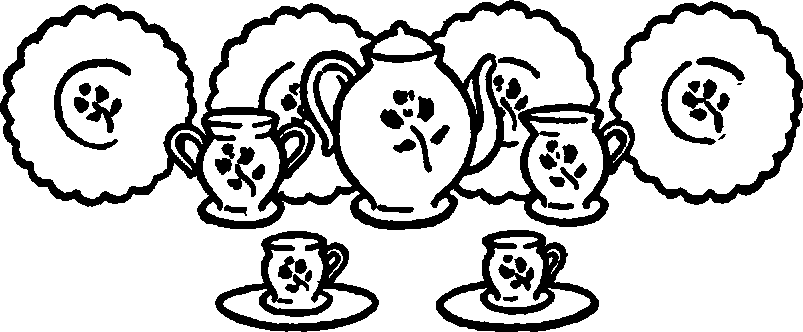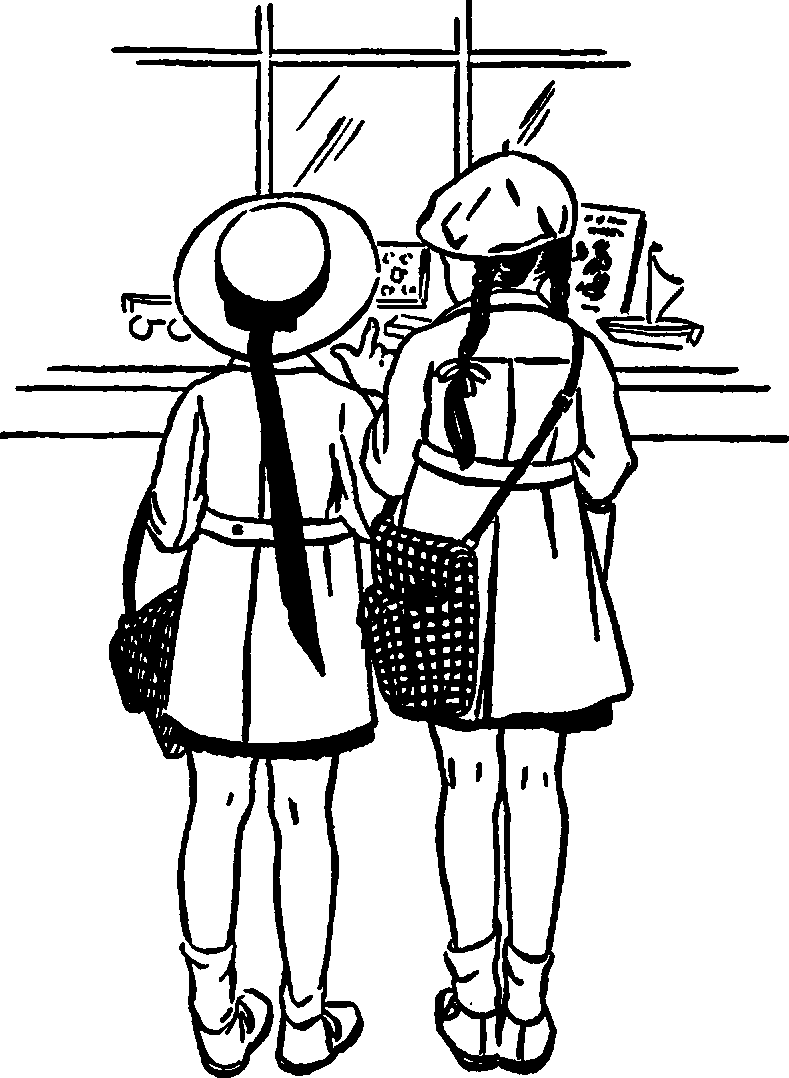"B" Is for Betsy (4 page)
Authors: Carolyn Haywood

When school began, Miss Grey told the children that the two little bumps were going to be Waggle's legs and that they would grow larger and larger.
"Will Waggle get any more legs?" asked a little boy.
"You wait and see," said Miss Grey.
"I think he will," said Ellen.
"I do too," said Billy.
Sure enough, some time later, two more little
bumps appeared and Waggle began to grow two front legs. Wiggle was very busy growing his back legs and trying to catch up with Waggle.
While the tadpoles were growing their legs, the children were busy learning about the Indians. They learned that there were some Indians who had lived in wigwams made of the skins of animals and some who had lived in wigwams made of birch bark. Miss Grey also told them of Indians who had lived in caves cut in the side of the rocks. The children spent days at the sand table, building an Indian village. They decided to build a wigwam village at one end of the table and a cave village at the other end. They built the wigwam village first. They made the little wigwams of twigs covered with brown paper. They brought little dolls, which they colored with paint.
Betsy thought the Indian village was beautiful. There was even a forest. The trees were made of pieces of sponge painted with green paint. In the middle of the forest there stood a little toy deer. "Because," said Billy, "if there isn't any game the Indians will starve." Billy had learned that animals that are hunted are called "game." He felt very big when he used
 this new word because the other children thought that game was just something that you played and sometimes won and sometimes lost.
this new word because the other children thought that game was just something that you played and sometimes won and sometimes lost.
One morning when the children looked in the bowl to see how Wiggle and Waggle were growing, Waggle looked very strange indeed. "Waggle has lost almost all of his tail," cried Betsy.
"Yes," shouted the children, "look at him, Miss Grey."
"Why, Waggle looks like a frog," said Ellen.
"Waggle is a frog," said Miss Grey. "All this time, Waggle has been turning into a frog." The children laughed. They thought Waggle was wonderful to have turned into a frog.
"He should have a stone to sit on," said a little boy. "Frogs like to sit on stones."
"Yes," said Miss Grey, "and I have had a stone waiting for Waggle." Miss Grey let Billy put the stone in the bowl because Billy had brought the tadpoles to school. The top of the stone stuck up above the water. Later that day, Betsy looked in the bowl and there was Waggle sitting on the stone.
One morning when Miss Grey came into her classroom, Kenny Roberts was alone in the room. He was sitting at his desk busily pasting pictures

in his scrapbook. Kenny had been absent for several days and Miss Grey had asked him to come to school early and paste his pictures so that he would catch up with the other children.
"Good morning, Kenny," said Miss Grey, "you are a very good boy to get here so early to paste your pictures."
Kenny said "Good morning" and pounded very hard on a picture of a horse.
"Do it quietly, Kenny," said Miss Grey.
Kenny was a very small boy. He was like a little eel for he was never still. His black eyes
were always dancing in his head. When he knew the answer to one of Miss Grey's questions, he would lean way over his desk and shake his hand so hard that Miss Grey thought that some day he would surely shake it off. Kenny always knew the answers. When there was an errand to be done, Miss Grey sent Kenny because he always came back with the right thing.
In a few moments Betsy and Ellen came into the room. "Oh, Kenny," cried Betsy, "did you see Waggle?"
"He is all grown up," said Ellen.
"I'm busy," said Kenny. "I have to paste my pictures."
Betsy and Ellen went to the windowsill and looked in the bowl. "Oh, Miss Grey," cried Betsy. "Waggle is gone!"
Miss Grey left the blackboard where she was drawing a clock and came to the children. Sure enough, Waggle was gone. "He must have jumped out of the bowl," said Miss Grey. The children began looking all around. They looked on the windowsill and on the floor. Kenny stopped pasting pictures and joined the search. As more children arrived they looked for Waggle. They looked on the nearby table and they looked be
hind the books. They even looked in the wastepaper basket, but Waggle was nowhere in sight. "Oh, dear," said the children, "where could he have gotten to?"
The bell rang for school to begin and the children sat down at their desks. Miss Grey thought she had never seen so many sad little faces before. "Never mind," said Miss Grey, "we won't worry about Waggle. We shall find him for he must be in the room somewhere."
Later in the morning the children went to the sand table to build the Indian cave village. Ellen dipped some water out of the bucket which was under the table. She poured it on the sand. The children began to build the wet sand into a pile. "First we have to make the big rock," said Billy.
"Yes," said Mary Lou, "because the Indians cut the caves out of the rock."
"I'm going to be an Indian when I grow up," said Richard.
"You can't be an Indian," said Ellen.
"Yes, I can," answered Richard.
"You can't be an Indian, because your mother and your daddy are not Indians," said Betty Jane.
"Well, I don't care, I am going to be an Indian
anyway," said Richard, and he patted the sand very hard.
Suddenly one of the little wigwams at the other end of the table jumped up and landed in the middle of the table. "Oh!" squealed the children, and the wigwam jumped again and knocked down an Indian brave and two girls. "Oh! Oh!" squealed the children.
Miss Grey picked up the wigwam and there was Waggle. He hopped all around the village, knocking over more Indians.
Miss Grey caught him and put him back in the bowl. She looked at all the children. When she looked at Kenny, his face grew very, very pink. "Kenny," said Miss Grey, "did you put the little frog under the wigwam?"
Kenny shook his head up and down and wondered how Miss Grey knew that he had hidden Waggle.
"That wasn't like you, Kenny," said Miss Grey.
Kenny's eyes filled with tears, as all of the children looked at him.
"I think Kenny had better sit in the little chair in the corner and do some quiet thinking," said Miss Grey.
Kenny walked to the corner and sat down with his back to the room.

The children were very quiet as they stood the Indians up again and straightened the wigwams. Kenny sniffled and gulped hard. Ellen looked in the bowl. "Oh, Miss Grey," she cried, "Wiggle is sitting on the stone too. Now we have two little frogs."

Ellen and Betsy were very best friends. They always played together in the schoolyard. Sometimes Ellen would go home with Betsy after school and sometimes Betsy went with Ellen. Betsy lived in a bigger house than Ellen and Betsy had more toys, but Ellen had a baby sister. She was just like a real live doll. Ellen had a grandmother too. She lived at Ellen's house.
Grandmother knew how to make cinnamon buns and always remembered that children like cinnamon buns to be very sticky. So Betsy loved to visit Ellen just as much as Ellen liked to visit Betsy.
One day Betsy and Ellen met at the Good Lady's store. Betsy was buying a red pencil and Ellen was buying a blue one. The Good Lady kept a tiny store right near the school. She sold ice cream and candy, pencils and notebooks, erasers, crayons, and toys. Her name was Mrs. Good, but she was called the Good Lady by all the children because she always made the ice-cream cones stand up like mountains. No child ever bought a pencil or a notebook from her without receiving a peppermint drop or a jelly bean.
The two little girls left the shop together. They were each sucking a peppermint drop. Outside, they stopped to look in the window. The Good Lady's window was always shiny and clean. "Oh, Betsy," cried Ellen, "look at the dear little set of doll's dishes." Right in the center of the window there was a box filled with the prettiest dishes Betsy had ever seen. There were six tiny cups, no bigger than thimbles, and six tiny sau-
 cers. There was a little teapot, a sugar bowl, and a cream pitcher. Each piece had a bright pink rose painted on it. They were all carefully packed in pink cotton. "I would love to have those dishes for my birthday," said Ellen.
cers. There was a little teapot, a sugar bowl, and a cream pitcher. Each piece had a bright pink rose painted on it. They were all carefully packed in pink cotton. "I would love to have those dishes for my birthday," said Ellen.
Ellen's birthday was only two weeks off.' Ellen had been talking about her birthday for a long time. It was a very important birthday because Ellen would be six years old. She wished that she could have a party, but Ellen's father worked at night and he had to sleep in the daytime. So the children could never have parties. You couldn't have a birthday party without a donkey game, and you couldn't play a donkey game without making a noise. So Ellen would not be able to have a party. But there would be presents. Ellen said there were always presents even if you didn't have a party.
After school, Betsy stopped at the window again to look at the dishes. How she would love to give those pretty little dishes to Ellen for her birthday! Betsy decided that she would take all of her money out of her bank. She would buy the dishes with the money. Betsy's little bank was a round, fat, yellow duck. He opened his wide bill and swallowed pennies. Betsy called
him Big Bill. She wondered whether Big Bill had swallowed enough pennies to pay for the dishes. Father gave Betsy ten brand-new pennies every week. She had been putting half of them in Big Bill. "But now I will put all of them in," thought Betsy. She fed every one of Father's ten pennies to Big Bill. When Mother gave her a penny for candy or a pretzel, Betsy dropped it in her bank. Big Bill grew heavier and heavier. When Betsy shook him he rattled loudly and made Betsy feel very rich. She was sure that she would be able to buy the dishes very soon.